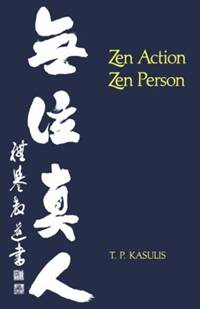ZEN MESTEREK ZEN MASTERS
« Zen főoldal
« vissza a Terebess Online nyitólapjára

Thomas P. Kasulis (1948-)
Thomas P. Kasulis
Professor
Department of Comparative Studies, The Ohio State University
Thomas Kasulis is an internationally recognized scholar of Japanese philosophy and religion. The international value of his scholarship is built on his unique ability to describe the subtlety and nuance of concepts deeply embedded in Japanese culture and history in terms accessible not only to Western students of philosophy but to the generally educated reader. His first book, Zen Action/Zen Person , established the field of Japanese philosophy. His two other single-author books established new specialties in Asian studies, comparative philosophy and
religious studies.
One colleague stated that, “His knowledge of the Japanese tradition in the original literature is unparalleled, and he brings real philosophical rigor to his research.”
Another said, “His work makes not only esoteric Japanese religions and philosophy accessible but is also actually relevant to modern Westerners, and his weaving together of the disparate and sometimes contentious fields of philosophy and religious studies is respected and well known around the world. It is no exaggeration to state that Tom Kasulis approaches being a living legend in the field internationally.”
Kasulis is a leading figure in the American Academy of Religion, the world's largest scholarly organization devoted to the study of religion. He has served as president of the American Society for the Study of Religion and of the Society for Asian and Comparative Philosophy. He serves on the editorial boards of several leading publications in his field, including T he Eastern Buddhist , the Nanzan Library of Asian Religion and Culture's series on Japanese Thought and Culture and the Stanford Encyclopedia of Philosophy . He has published three single-author books, five co-edited collections and 70 articles and book chapters. His works have been translated into eight languages.
Kasulis received his BA and MPhil from Yale University, his MA from the University of Hawaii and his PhD from Yale University. He has been at Ohio State since 1991.

PDF: Zen Action - Zen Person
Honolulu: University of Hawaii Press. 1985.
T. P. Kasulis: "The Zen Philosopher: A Review Article on Dôgen Scholarship in English."
Philosophy East and West, 1978. 28, 3: 353-373.
T. P. Kasulis: "The Incomparable Philosopher: Dōgen on How to Read the Shōbōgenzō."
In: William R. LaFleur, ed., Dôgen Studies, pp. 83-98. Honolulu: University of Hawaii Press. 1985.
T. P. Kasulis: Truth and Zen: a very philosophical look. Kasulis looks at how Aristotle, Thomas, Hui Neng, Lin Chi and Dogen approached the issue of 'truth'. He finds that Zen and Western philosophy diverge "when they consider what the purpose of thinking is and what the basic relationship between man and world is." It's not so much that they think differently, rather they "disagree about what we should think about."
from: Philosophy East and West, Vol. 30. No. 4, 1980
T. P. Kasulis: Zen as a Social Ethics of Responsiveness One reason traditional Chan or Zen did not develop a comprehensive social ethics is that it arose in an East Asian milieu with axiologies already firmly in place. Since these value orientations did not conflict with basic Buddhist principles, Chan/Zen used its praxes and theories of praxis to supplement and enhance, rather than criticize, those indigenous ethical orientations. When we consider the intercultural relevance of Zen ethics today, however, we must examine how its traditional ethical assumptions interface with its Western conversation partners. This paper analyzes special philosophical problems arising when one tries to carry Zen moral values without modification into Western contexts.
from Journal of Buddhist Ethics
Purifying Zen: Watsuji Tetsuro’s Shamon Dogen
Watsuji, Tetsuro, 1889–1960. [Shamon Dogen. English]
translated and with commentary by Steve Bein
Foreword, by Thomas P. Kasulis
University of Hawai‘i Press, 2011